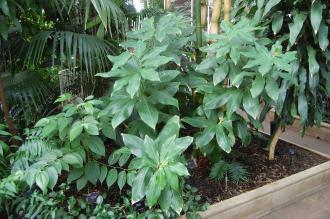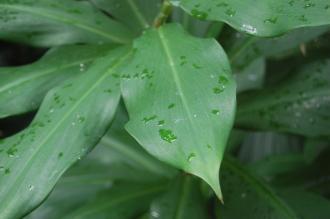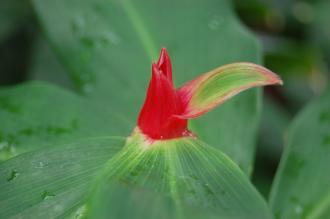
Costus barbatus (28/02/2016, Kew Gardens, London)
Position: Full sun to partial shade
Flowering period: Late summer
Soil: Moist, well drained
Eventual Height: 2.5m
Eventual Spread: 2m
Hardiness: 9a, 9b, 10a, 10b, 11, 12
Family: Costaceae
Costus barbatus is a variable tropical evergreen perennial with a upright habit. Its dark green leaves have a light green velvety underside, are elliptic with entire margins, up to 30cm long and 10cm across. Its yellow flowers emerge from red bracts and appear terminally. Its flowers will only appear if the plant is not exposed to freezing conditions during the previous winter months. Its roots contain rhizomes which aids its spread.

Costus barbatus Leaf (28/02/2016, Kew Gardens, London)
Costus barbatus, commonly known as Spiral Ginger or Red Tower Ginger, is native to Costa Rica. In its native habitat it grows in moist well lit thickets. In it native habitat Costus barbatus is considered as Critically Endangered according to The IUCN Red List of Threatened Species.
The etymological root of the binomial name Costus is derived from the Sanskrit name ‘Kushtha’. Barbatus is derived from the Latin barba meaning ‘beard’, in reference to the undersides of its leaves.
The landscape architect may find Costus barbatus useful as a large specimen foliage houseplant with attrative flowers suitable for bright locations. It would also be suitable for atrium and conservatory planting schemes.
Ecologically, Costus barbatus is attractive to some pollinating insects and hummingbirds.

Costus barbatus Flowering Tip (28/02/2016, Kew Gardens, London)
Costus barbatus prefers moist, humus rich, fertile, well-drained soils. It tolerates most pH of soil.
When maintaining Costus barbatus as a houseplant its soil should be watered regularly. Watering should be reduced during the winter months. Its preferred active growing temperature rages from between 16ºc to 24ºc, it will tolerate temperatures as low as freezing. Feeding with weak fertiliser solution should be carried out once a month during the growing season.

Landscape Architecture

